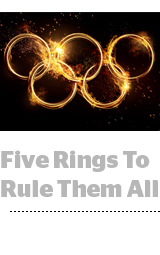 The majority of snowboarding gold medals in the 2018 Winter Olympics were won by competitors in head-to-toe Burton gear, so why do the sports outfitter’s social media pages seem oblivious to the company’s biggest brand event of this half-decade?
The majority of snowboarding gold medals in the 2018 Winter Olympics were won by competitors in head-to-toe Burton gear, so why do the sports outfitter’s social media pages seem oblivious to the company’s biggest brand event of this half-decade?
It’s because the International Olympic Committee (IOC) goes to unmatched lengths to preserve the Olympic’s official brand sponsors.
The IOC’s aggressive trademark enforcement is nothing new – In 1995 the Olympic organizing committee unsuccessfully sued Audi to keep the auto brand off the air because its four-ringed logo is similar to the Olympic rings.
For any company not affiliated with the IOC, but relevant to winter sports or athlete development programs, the potential damage from crossing the Olympic committee – which sues at the drop of a hat and can elevate a rival’s brand to one of the most coveted positions in sports marketing – means corporate caution vanquishes zealous marketers, said Fara Sunderji, a partner at the law firm Dorsey & Whitney who specializes in trademark infringement and marketing.
The IOC’s litigious mentality hasn’t shifted, but the demands of a fragmented media world have forced concessions.
In the run-up to the 2016 Olympics in Rio, Brazil, the IOC amended Rule 40, a longstanding policy forbidding athletes from using their brand or likeness for marketing during the games, so that unofficial brands could apply for a waiver to promote an athlete as long as the brand doesn’t use any Olympic trademarks.
Under Armour, for instance, secured a waiver in 2016 to run an ad featuring Michael Phelps despite Nike being an official Olympic brand and the suit supplier for the US swim team. Under Armour winks at the Olympic association with a YouTube tagline saying Phelps “returns for one last time,” but the ad is stripped of any trademarked phrases or Olympic imagery.
But Under Armour’s waiver for an ad featuring Phelps only underscores the frustration from the rank and file of Olympic athletes.
A brand like Under Armour is willing to pay out the nose twice – a check to the IOC to secure its waiver and then for the media buy – to keep its association with Phelps during the Olympics, where he competed in Nike gear. But no brand is going to do that unless it’s positive the athlete will qualify and be an Olympic sensation.
It’s a system that rewards those at the top while most Winter Olympics athletes miss a much-needed opportunity to earn money and exposure.
Take Chloe Kim, the 17-year-old gold medalist and snowboarding phenom: She’s sponsored by official Olympic brand partners including Toyota, Visa, Samsung and Nike, and has been running social marketing campaigns with the Olympic brands since late last year.
But while a handful of sure bets for the Olympic podium and public acclaim are awash in official partner deals, most athletes have to shelve their sponsors during the games.
Earned media and publicity opportunities are tightly controlled as well. Athletes are allowed to do media interviews if they’ve won a medal, but must give first dibs to NBC before speaking with any media outlet on behalf of a sponsor, according to three frustrated brand representatives temporarily unable to schedule appearances.
The German Federal Cartel Office, which regulates anti-competitive business practices, won the right for German athletes to continue doing generic advertising – meaning marketing with no Olympic association – and to do call-outs for sponsors on social media.
You can see the difference from the Instagram feed of Eric Frenzel, a German Nordic skier with two gold medals at the PyeongChang games who’s been using Adidas marketing tags like #HereToCreate and, more straightforwardly, #Adidas.
Adidas similarly has Olympic branded content on its German national account page, while its main account and Adidas Canada ignore the games.
Posting nothing at all is safer than putting your brand in the hands of “a mid-20-something social media manager with no grounding in the unique trademark situation during the Olympics,” Sunderji said, when firing off a tweet including lines as generic as “going for gold” or “Team USA” could have serious repercussions.
This post was syndicated from Ad Exchanger.

More Stories
TTD Is All Systems Ro’; Insta Takes Another TikTok Tactic
Agencies partner with oOh!media NZ to back Youthline
At Newfronts, Condé Nast Calls Red Carpet Moments the New Live Sports